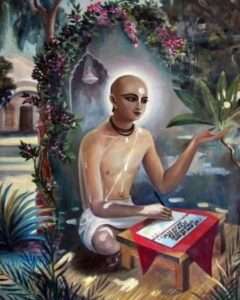 Criticism of Jiva Gosvami
Criticism of Jiva Gosvami
There are those who try to defame Sri Jiva by criticizing some of his behaviors. These people do not know that the Acarya can also behave incomprehensibly to educate his disciples. Sometimes the flaws are only apparent, as in the story of Syamananda Prabhu and his guru Hrdaya Caitanya; in other cases, however, the criticisms are totally unfounded, as in the case of Jiva Gosvami and Krishnadas Kaviraja.
In the Vivarta-vilāsa, a sahajiyā work written at least a century after Jiva’s death, Jiva is said to have been involved in a controversy with Krishnadasa Kaviraja, according to which Jiva did not like the Caitanya Caritamrita because parakīyā was preached there.
vākyata kariyā kene karile varṇane
parakīyā bhāva kena kaile prakāśane
When the text was given to Jiva to read, he threw it into the Yamuna in anger. The book floated, however, showing that it had been accepted by the gods, and thus Jiva was forced to admit its greatness.
However Jiva was already dead when Krishnadas wrote that text, so there is no possibility that this story is true. It was written by sahajiya adherents of the parakīyā doctrine to show not only that Jiva was wrong, but that he had admitted the error of his ways.
This story, invented from scratch and found nowhere in Scripture, is rejected by all and is but a direct insult to a pure devotee.
Another criticism is that Jiva Gosvami denied the existence or validity of parakiya-rasa. Srila Prabhupada explains this by making it clear that some of Sri Jiva’s followers at that time could not accept the idea of extramarital love, even on a transcendental level. That is why he avoided dealing with the subject, precisely so as not to disturb their minds, and why he always supported the idea of svakiya.
He also avoided teaching parakiya-rasa so as not to provide more elements to the deviations of the Sahajiyas, which were already proliferating at that time. All the falsehoods and criticisms mentioned above have been refuted by many genuine Acaryas.
This is a section of the book “Tattva Sandarbha”, in English.
To buy the complete book, click here



Leave a Reply